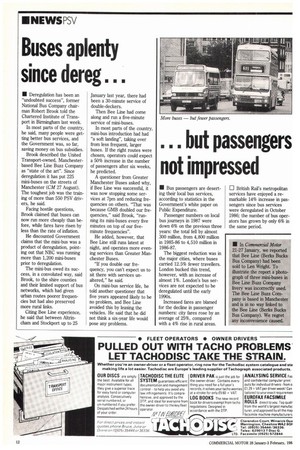Buses aplenty since dereg . . .
Page 14

If you've noticed an error in this article please click here to report it so we can fix it.
• Deregulation has been an "undoubted success", former National Bus Company chairman Robert Brook told the Chartered Institute of Transport in Birmingham last week.
In most parts of the country, he said, many people were getting better bus services, and the Government was, so far, saving money on bus subsidies.
Brook described the United Transport-owned, Manchesterbased Bee Line Buzz Company as "state of the art". Since deregulation it has put 225 mini-buses on the streets of Manchester (CM 27 August). The toughest job was the training of more than 550 PSV drivers, he said.
Facing hostile questions, Brook claimed that buses can now run more cheaply than before, while fares have risen by less than the rate of inflation.
He discounted Government claims that the mini-bus was a product of deregulation, pointing out that NBC was running more than 1,200 mini-buses prior to deregulation.
The mini-bus owed its success, in a convoluted way, said Brook, to the shire counties and their limited support of bus networks, which had given urban routes poorer frequencies but had also preserved more rural links.
Citing Bee Line experience, he said that between Altrinchant and Stockport up to 25 January last year, there had been a 30-minute service of double-deckers.
Then Bee Line had come along and run a five-minute service of mini-buses.
In most parts of the country, mini-bus introduction had had "a soft landing", taking over from less frequent, larger buses. If the right routes were chosen, operators could expect a 50% increase in the number of passengers after six weeks, he predicted.
A questioner from Greater Manchester Buses asked why, if Bee Line was successful, it was now stopping some services at 7pm and reducing frequencies on others. "That was because GMB doubled our frequencies," said Brook, "running its mini-buses every five minutes on top of our fiveminute frequencies".
He added, however, that Bee Line still runs latest at night, and operates more evening services than Greater Manchester Buses.
"If you double our frequency, you can't expect us to sit there with services unaltered," he said.
On mini-bus service life, he told another questioner that five years appeared likely to be no problem, and Bee Line avoided this by leasing the vehicles. He said that he did not think a six-year life would pose any problems.
























































































